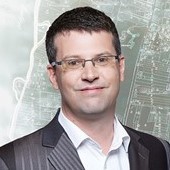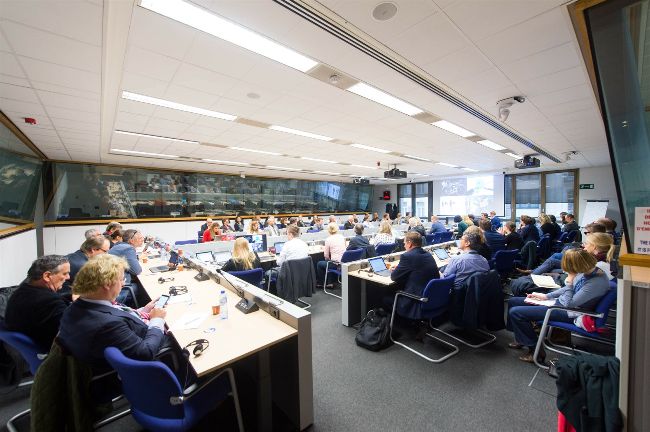# EURegions Week: Social netowrking and policy updates

Kai Böhme
The first time I attended the Open Days ? called later the European Week of Regions and Cit ies (EWRC) ? was in 2002 or 2003. Since then, I have been a regular guest and have attended as a participant, speaker , panellist, moderator and organiser of sessions. In 2017, I even ended up on the banner of a news flash for the EWRC, depicting a panel discussion jointly organised by Interreg Europe, Urbact, Interact and ESPON in 2016.
Over the year s, the Open Days have not only changed name to European Week of Regions and Cit ies, but they have also grown considerably bigger in terms of the number of sessions and participants, and has changed its format and location. In m any w ays, t he evolut ion of it s form at has increased it s added value. In the beginning it was very much about getting direct access to ? and first-hand information from ? officials at DG REGIO and the European Committee of the Regions. Increasingly, it has become much more a ?com m unity? event, where the added value com es from interacting with people from all corners of Europe. This community com prises people working at local regional, national and European levels, people working in the field of territorial cooperation and researchers in the field of regional developm ent and policy. However, to me, the benefits rem ain the sam e. It is one of the most important events in our field for networking and staying up to date with recent debates and policy developm ents.

Planned and unplanned meetings and discussions with colleagues from all over Europe are the most stimulating benefits of this fixed week in October ? and are what I miss most in the new online format. One of my best memories is a contact made due to a m istaken name, when with a researcher from Austria; We only figured out after half an hour of intensive debate that she had m istaken me for someone from the Germ an Federal Office, whom she was supposed to meet. We st ayed in contact for many years after that. On another occasion, I engaged in a discussion with a stranger following a session. After some time, we realised that we were long-standing cooperation partners; however, we had never met in person and had only com m unicated by em ail from our offices in
,,I could really feel how benef icial part icipat ing in t he EWRC was for st udent s and early-career researchers beca use of t he enormous number of cont act s t hey developed and t he f eedback t hey received on t heir work,,
Ancona and Stockholm (this was before videoconferencing tools becam e widely available). I also have very fond memories of endless discussions over food and drinks in the vicinity of the event. In some of the discussions new ideas were born and I am convinced that many policy innovations and experim ental policy initiatives can be traced back to lively, discussions following sessions at the European Week of Regions and Cit ies.
Besides the social dimension, the European Week of Regions and Cit ies is an essent ial forum for staying up to date with things going on in various fields of activity. Th ese range from changing policy agendas to forward-looking debates about emerging developm ents, experience with innovative pilot initiatives at local, regional, cross-border, transnational and m acroregional levels, and the lat est research findings relating to regional policies and regional developm ent ? not least by ESPON.
I dare say that often new topics in regional policies have first been t est ed in sm all session s at the European Week of Regions and Cit ies, and some topics grew bigger over the years until they becam e part of the m ainstream .
I recall, for exam ple, the evolution of indicator system s for the monitoring and evaluation of Cohesion Policy, and in particular territorial cooperation initiatives and program m es. In addition, the advancem ent and recognition of territorial evidence for regional policies, and various support schem es for sharing experience and practices across cities, regions and countries; can be traced through the agendas of the European Week of Regions and Cit ies.
,,I am convi nced t hat many policy innovat ions and experiment al policy init iat ives can be t raced ba ck to lively discussions following sessions at t he EWRC,,
2021 will be one of those years where a lot of new insights can be gathered, as there is a wide range of new policy instruments to be discussed. I expect to learn a lot about the new Cohesion Policy period, the Recover y and Resilience Facilit y, the Just Transit ion Fund and, of course, the emerging ?new norm al?after COVID-19. It will also be interesting to learn about the first experiences and steps of translating the ?Ter r it or ial Agenda 2030?, the ?Long-t er m vision for the EU?s rural areas?an d the ?New European Bauhaus?int o practice. Th at is, how a future for all places and people will take shape. Looking som ewhat further into the future, I hope to get m ore insight s int o em erging European debat es about changing understandings of cohesion as an overall value of EU policies, and economic policym aking beyond GDP. Certainly, I am also curious to learn more about the VASAB long-term vision for the Baltic Sea Region and lat est ESPON insights on the territorial diversity of Europe, including those related to emerging research on territorial quality of life.
Therefore, I encourage my colleagues at Spat ial Foresight ? especially the younger ones starting out in their careers ? to closely follow the # EURegionsWeek. I also urge others interested in regional developm ent and regional policies to act ively participate. So far, for me, attending the event has always been worthwhile. This is one of my favourite weeks in the year and has a fixed place in my calendar. I look forward to meeting you there!
Kai Böhme, partner & director, Spatial Foresight